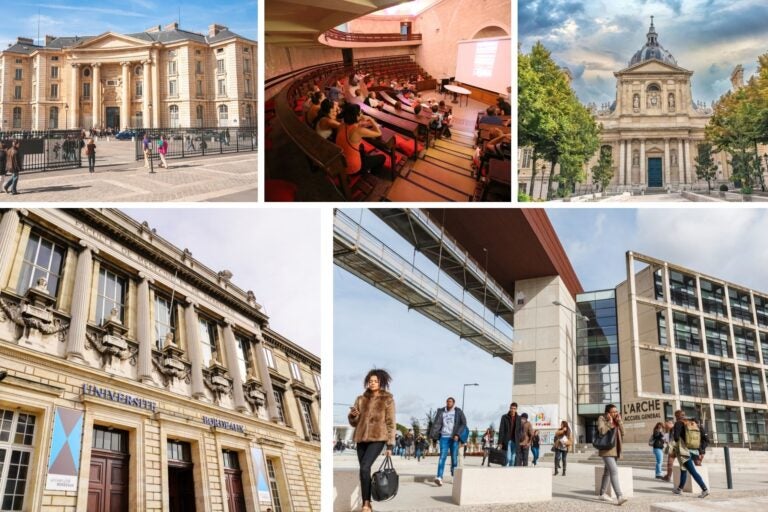Scholarship in France: Requirements and how to apply
The most prestigious universities in Paris await you! Here are 5 of the best scholarships to study in France.
Dreaming of studying at top universities in Paris, Lyon, or Marseille? The key is finding the right scholarship for your academic profile and applying for it. If you’re not sure where to start, don’t worry—at Holafly, we’ve gathered all the essential information to make your search easier.
There are plenty of scholarship options available, whether from the government or private universities. It’s important to keep track of deadlines, requirements, and the most prestigious institutions. Studying in France without financial aid can be costly, and not everyone can afford it. That’s why, in 2025, both the French government and private institutions will continue offering scholarships for local and international students. Let’s take a look at them!
Top 5 scholarships to study in France
If you have an outstanding academic record, you could qualify for some of the top scholarships in France—whether for an undergraduate degree, a master’s, or even doctoral research. The French government offers various funding programs to promote academic mobility and attract international talent to its renowned institutions.
To stay on top of every update once you arrive in France, it’s a good idea to get a Holafly eSIM for secure and unlimited internet access. Also, opening a French bank account is highly recommended, as many scholarship applications require it for fund transfers. Now, let’s dive into the top five scholarships available. Are you ready?
1. Eiffel Excellence Scholarship Program – Ministry of Europe and Foreign Affairs
The French Ministry for Europe and Foreign Affairs created the Eiffel Scholarships to train future global leaders in fields like political science, engineering, law, and economics. This prestigious program selects top international students from outside Europe, offering them funding to pursue a master’s or PhD. Here’s what you need to qualify:
- General requirements: You must be under 30 (for a master’s degree) or under 35 (for a doctorate). You must also have an outstanding academic record, be nominated by a French institution and not belong to a European country.
- Coverage and benefits: They offer a monthly allowance of 1,181 euros for master’s degrees and 1,700 euros for doctorates ($1,230 and $1,770, respectively). In addition, tuition fees are waived and they help you with international transportation, installation costs and medical insurance.
- Type of studies offered: Master’s degree and doctorate.
- Aimed at: Non-European international students.
- Form: Through the French institution to which the student has been admitted. More information is available at www.campusfrance.org/fr.
- Opening date: Starting in October.
- Closing date: January of the following year.
2. Emile Boutmy Scholarships – Political Science
Named after Emile Boutmy, a renowned French writer and political scientist and founder of Sciences Po, these scholarships aim to attract top international students from outside Europe to study at France’s leading universities. The selection process considers academic excellence, motivation, previous studies, and relevant experience. Think you qualify? Here’s what you need to know:
- General requirements: Must be an international student from outside the European Union. You must prove a high academic level and have no resources to pay for your studies. In addition, you must be admitted to a Sciences Po program.
- Coverage and benefits: Between 3,000 and 12,300 euros per year ($3,125 and $12,810), depending on the program and the student’s financial situation.
- Type of studies offered: Undergraduate and master’s degree.
- Aimed at: International students from developing countries or with limited income.
- Form: Directly on the official website www.sciencespo.fr.
- Opening date: Fall of the year prior to the start of the course.
- Closing date: March of the following year.
3. Fondation de France Scholarships
For over 50 years, Fondation de France has been supporting young students in achieving their academic goals. This private institution promotes higher education and research by offering scholarships for international students across various fields. Here’s what you need to know about this exciting opportunity:
- General requirements: Excellent academic performance, admission to a French university and proven commitment to research or excellence in your field of study.
- Coverage and benefits: Financial aid between 5,000 and 10,000 euros per year ($5,206 and $10,413). There is also the possibility of funding for specific research projects.
- Type of studies offered: Bachelor’s, master’s and doctoral degrees.
- Aimed at: Students of any nationality who meet the criteria of excellence established by the foundation.
- Form: Through the foundation’s official website www.fondationdefrance.org/fr.
- Opening date: March.
- Closing date: June.
4. Erasmus+ Scholarships – European Union
One of the most popular scholarships for studying in France is the Erasmus+ Scholarship, backed by a €26.2 billion budget for the 2021-2027 period. The European Union is investing in a more inclusive, sustainable, and digital education system through this program. Unlike other scholarships, Erasmus+ supports a wide range of applicants—not just university students, but also athletes, educators, and those seeking internships or vocational training. Here’s what you need to qualify:
- General requirements: Must be enrolled in a participating school and meet the academic criteria of the Erasmus+ program.
- Coverage and benefits: Tuition, travel and accommodation allowances, which vary according to the duration and destination of the program.
- Type of studies offered: Bachelor’s, Master’s, PhD, internships, teacher training, sports, adult studies and vocational training.
- Aimed at: Students of any nationality participating in Erasmus+ exchange programs.
- Form: Through the university of origin. More information can be found on the website www.erasmus-plus.ec.europa.eu.
- Opening date: Depends on each university.
- Closing date: Variable.
5. Ampère Scholarships – Ecole Normale Supérieure de Lyon
The École Normale Supérieure de Lyon (ENS) offers prestigious scholarships for international students with outstanding academic records. These scholarships are exclusively for master’s programs in Exact Sciences, Arts, Humanities, and Social Sciences. If you’re considering applying, here are some key details you should know:
- General requirements: Hold a bachelor’s degree or equivalent. In addition, you must prove outstanding academic merit. A cover letter and references are also required.
- Coverage and benefits: Financial aid of 1,000 euros per month ($1,041) for 10 months. You have preferential access to university residences and support for cultural integration in France.
- Type of studies offered: Master’s degree programs.
- Aimed at: International students of any nationality.
- Form: Through the official website of the ENS Lyon, www.ens-lyon.fr.
- Opening date: November.
- Closing date: January of the following year.

Tips on how to get a scholarship in France
When applying for scholarships to study in France, it’s crucial to research each program thoroughly and apply only to those that align with your qualifications. By following the tips we’ve gathered for you, you’ll increase your chances of success in the application process:
- Master the French language: Even if the programs are in English, including some French language training can make a big difference in your application. It shows greater motivation and a stronger commitment to French culture.
- Find out about French government scholarships and Erasmus+: These are some of the most accessible scholarships, so even if you apply for a private one, make sure to also apply for these public ones. If you don’t make it through the tough selection process of the private committee, you can still apply for this government and EU program.
- Take advantage of opportunities for students from outside the EU: Many scholarships are specifically designed for students from non-EU countries. Programs like the Eiffel Scholarships or those offered by French regions often give priority to this group.
- Adapt your cover letter to the French approach: In France, it’s important to clearly outline your academic goals. Be sure to also highlight your interest in French culture and education.
- Take advantage of bilateral agreements between your country and France: Check with your local French embassy or consulate to find out which scholarships are available.
- Participate in educational fairs and webinars organized by Campus France: In addition to getting first-hand information about the scholarships, it’s a networking opportunity.
- Prepare your documents with enough time: France has specific requirements for each scholarship, such as official translations of diplomas, academic certificates, and recommendation letters. Make sure you have everything ready before the deadlines.
Top Universities to study in France
What course do you want to study? We recommend you first choose the program you’re interested in and then find the best university in France that specializes in that field. This way, you’ll get a better academic experience with expert professors and classrooms designed for your studies. Here’s a summary of the top-rated institutions in France. These universities not only offer high-quality academic programs but are also located in cities known for their exceptional quality of life.

| University | Featured careers | Reasons to choose it |
| Sorbonne University, Paris | Philosophy, Law, Political Science | Recognized worldwide for its academic excellence and interdisciplinary programs. |
| Ecole Polytechnique of Paris | Engineering, Mathematics, Computer Science | It offers elite scientific training and connections with leading global companies. |
| University of Lyon | Medicine, Biotechnology, Business | Located in an economic city with a strong medical research presence. |
| University of Strasbourg | Chemistry, Biology, European Law | Outstanding in natural sciences and for its proximity to European Union institutions. |
| University of Aix-Marseille | Marine Sciences, Environmental Engineering, Law | Renowned for its research in environmental sciences and its location. |
| PSL University of Paris | Arts, Natural Sciences, Economics | Fusion of prestigious institutions with a focus on innovation. |
Frequently asked questions about scholarships to study in France
The Eiffel Scholarship, offered by the Ministry of Europe and Foreign Affairs, is one of the most comprehensive, covering tuition, living expenses, travel, and insurance. It’s aimed at outstanding international students pursuing master’s and doctoral programs.
Many scholarships, like the Erasmus+ program, cover all expenses, including tuition and living costs, for students who choose France as their study destination.
Requirements may vary depending on the program, but the most common ones include: a strong academic record, proof of admission to a French university, a cover letter, academic references, and proficiency in either French or English.
Yes, many French universities offer programs in English, and some scholarships, such as Erasmus+ or those from École Polytechnique, allow you to apply without advanced French language skills.
Most scholarships are open to applications between November and January, although some may have specific deadlines that depend on the universities. Please check the exact dates on the official websites for the exact dates.
In most cases, yes. France allows international students to work up to 964 hours per year (about 20 hours a week), even if they have a scholarship. However, some scholarships may have specific restrictions, so it’s important to check the details.





 Language
Language 


















 No results found
No results found


